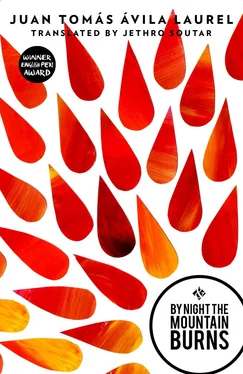Juan Ávila Laurel - By Night the Mountain Burns
Здесь есть возможность читать онлайн «Juan Ávila Laurel - By Night the Mountain Burns» весь текст электронной книги совершенно бесплатно (целиком полную версию без сокращений). В некоторых случаях можно слушать аудио, скачать через торрент в формате fb2 и присутствует краткое содержание. Год выпуска: 2014, Издательство: And Other Stories Publishing, Жанр: Современная проза, на английском языке. Описание произведения, (предисловие) а так же отзывы посетителей доступны на портале библиотеки ЛибКат.
- Название:By Night the Mountain Burns
- Автор:
- Издательство:And Other Stories Publishing
- Жанр:
- Год:2014
- ISBN:нет данных
- Рейтинг книги:5 / 5. Голосов: 1
-
Избранное:Добавить в избранное
- Отзывы:
-
Ваша оценка:
- 100
- 1
- 2
- 3
- 4
- 5
By Night the Mountain Burns: краткое содержание, описание и аннотация
Предлагаем к чтению аннотацию, описание, краткое содержание или предисловие (зависит от того, что написал сам автор книги «By Night the Mountain Burns»). Если вы не нашли необходимую информацию о книге — напишите в комментариях, мы постараемся отыскать её.
By Night the Mountain Burns — читать онлайн бесплатно полную книгу (весь текст) целиком
Ниже представлен текст книги, разбитый по страницам. Система сохранения места последней прочитанной страницы, позволяет с удобством читать онлайн бесплатно книгу «By Night the Mountain Burns», без необходимости каждый раз заново искать на чём Вы остановились. Поставьте закладку, и сможете в любой момент перейти на страницу, на которой закончили чтение.
Интервал:
Закладка:
Speaking of that man who came crying to our house because his woman wasn’t intact, or wasn’t as he expected to find her, makes me think of what it was like as a boy growing up with girls. I’ve already said that when we learned the ideo-visual Spanish alphabet the boys sat separately from the girls. And when you went to Misa on Sunday, if you were a boy or a man you sat on the left, and if you were a girl or a woman you sat on the right, as you went into the church. The Padre never mentioned this during Misa , but it was instilled in us from an early age that males and females shouldn’t intermingle. We were told this to keep us away from the girls. And the girls were told the same thing. But we boys and girls also knew there were certain things you did without telling the adults. For example, playing at mummy and daddy. When our parents were out, and before we were old enough to go to school, we played at kitchen, dividing ourselves up as mummy, daddy and children. Those given the role of children ran errands and might get a smack. Whoever played mummy went away and brought back firewood and food; she’d been to the plantation. Whoever played daddy went away and brought back fish he’d caught at sea. The mummy cooked, we all ate and then it was bedtime. All of this was pretend, acted out as if we were giving a performance, though the smacks were real enough. At bedtime, the children curled up wherever, but the mummy and daddy slept together. We knew daddy had to sleep with mummy, even though it was something we’d never seen before. The children from our house, and indeed the children from most houses, knew that was the way it was meant to be — only there were no daddies to sleep with the mummies where we lived. And we didn’t know whether grandmother slept with grandfather as she was always the last one to go to bed. I never asked her where she slept. But anyway, we played at mummy and daddy and the two people playing the mummy and daddy roles slept together. And at our age, that was as far as it went. But I knew a girl and a boy could go and play mummy and daddy elsewhere, on their own, and do things they couldn’t do in front of the rest of the ‘family’, things that couldn’t be done in front of the children. Even though we lived in a house where we’d never seen our mothers do anything with men, for there were no men, or practically none, we knew you could go and play mummy and daddy on your own. From what I remember, nothing happened other than you went away and found a hiding place and then the game broke up because the ‘children’ didn’t like being abandoned by the ‘parents’, who’d gone away to play at being parents on their own. So all the ‘children’ got up and either tried to find the hiding place or said they didn’t want to play any more and went home. Like I said, nothing happened, but it was still something you couldn’t tell the adults you’d done. And even though nothing happened, when we grew older and wanted to take the game further than we had back then, we still called it playing mummy and daddy. We still thought it was a game. And we still didn’t tell the adults. But it might so happen that ‘mummy’ got upset, or one of the ‘children’ got jealous, and then tongues began to wag. Then the real parents found out and took drastic action. The girl could end up with chilli burning inside her, all for a sin she hadn’t committed, or had merely thought about committing, or had committed only a little bit, kids’ stuff. They used chillies to punish girls who’d done things with boys that they wouldn’t confess to. The chilli was put down there and they cried for hours. I think the Padre , the parents, the teacher and all the adults were worried about what we might get up to. And I think their vigilance was effective and most children became adults knowing you could play mummy and daddy but you couldn’t actually do it. In fact, any young man who’d reached the age of taking drinks to the house of a girl he wanted to marry might expect, as the canoeman who talked to grandfather on the beach did, that the girl he wanted to marry would be ‘intact’. That’s to say, that games of mummy and daddy had gone no further than rolling around on the ground with your eyes closed. But of course some children weren’t afraid of chillies, or they knew good hiding places — a house being built, your own house while the adults were out, or underneath an upturned canoe, for example. I think we must have been quite good at hiding, as I don’t remember many cases of chilli being applied, or tears from other such punishments. All of which is why I thought the man was overreacting when he came crying because the girl whose house he’d taken drinks to was not intact. He cried like a child, and everyone saw him cross the village with woe pouring from his heart. He’d overreacted. And what if he was lying when he said the girl wasn’t intact? What’s more, was it really something he couldn’t put up with? Was it really an insurmountable problem? In any case, I was born on the island and I grew up on the island and became a man on the island, and nobody ever told me anything about what to expect of a girl whose house you took drinks to because you wanted to start something serious. Or maybe these things were usually taught to you by the man of the house, and we didn’t have one. I grew up not knowing what to expect of a girl you spoke to with serious intentions. I didn’t know what being intact was, nor why it should make a man run crying through the village in the middle of the night feeling sorry for himself. How did people learn such things? Who taught that young man? If it was an important piece of knowledge, I grew up without it. Maybe you did need some special preparation before taking drinks to the house of the girl who’d won your heart, but I was never told about it. Oh, and I never saw chilli applied to a boy either, though I did hear of it happening.
I mention all this about boys and girls, infants really, to show how we lived in the big village, and in the other villages of our Atlantic Ocean island, and grew up believing whatever we understood or thought to be the truth. And of course there’s nothing remarkable about that, nothing special about boys and girls having eyes to see and hearts to feel with. As a general rule, all boys and girls who were at or below the age of first Communion were considered innocents, or ‘pures’. Everyone was pure up to that age, and I don’t remember any example of an evil happening that stopped them from being considered pure. Which meant that if for some reason you needed a ‘pure’, any child would serve the purpose. In the same way that men couldn’t be visited at night by a mysterious being that made them feel hot and want to bathe in the saltwater, as happened with the she-devils, children couldn’t become infected by evil. Be they boy or girl. Other than the usual illnesses, children were immune to evil. They were pure. And as I already said, they were used whenever pures were required. For example, in our village there was an illness that was treated using urine, but not anyone’s urine, only a pure’s urine, only a child’s. It was said that people suffering from that illness should be given a pure’s urine to drink, and if the doctor was dealing with such a case you’d see the doctor’s helpers going through the streets with bottles asking children to pee in them, as many bottles and children as it took. Only the urine of pures, boys or girls, but of course it wasn’t as easy for girls to pee into a bottle, though they did the best they could. I know the name of the sickness you treat using urine, but I only know it in my language, the language of our island. Looking back, I suppose if you really could treat that illness using urine, then surely anyone’s urine would do. By which I mean it would make no difference whether it was a child’s or an adult’s, though I see why they only asked pures to pee in bottles, the innocent. It’s fairly obvious why, but it does change what was meant by innocence.
Читать дальшеИнтервал:
Закладка:
Похожие книги на «By Night the Mountain Burns»
Представляем Вашему вниманию похожие книги на «By Night the Mountain Burns» списком для выбора. Мы отобрали схожую по названию и смыслу литературу в надежде предоставить читателям больше вариантов отыскать новые, интересные, ещё непрочитанные произведения.
Обсуждение, отзывы о книге «By Night the Mountain Burns» и просто собственные мнения читателей. Оставьте ваши комментарии, напишите, что Вы думаете о произведении, его смысле или главных героях. Укажите что конкретно понравилось, а что нет, и почему Вы так считаете.












